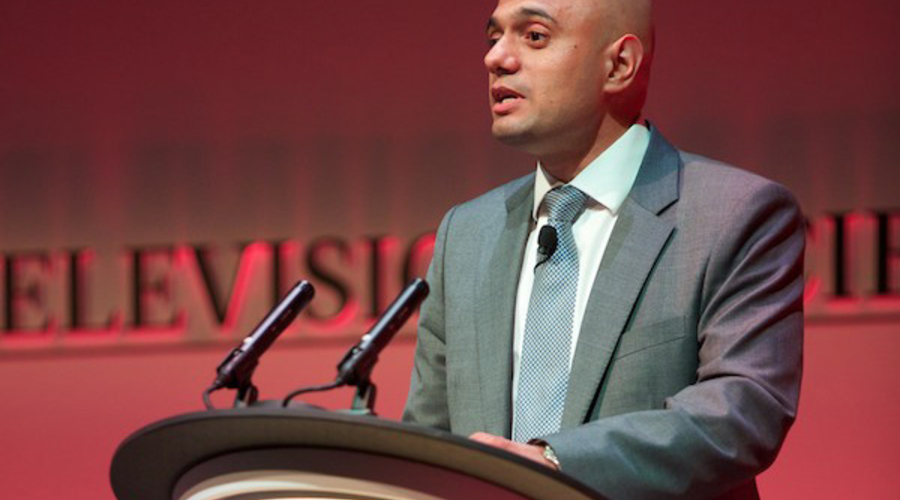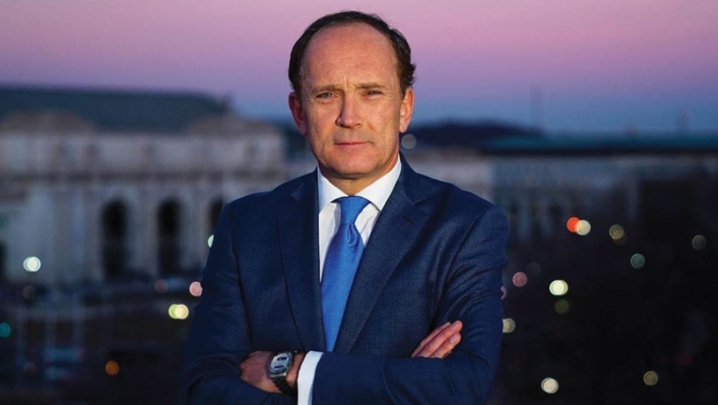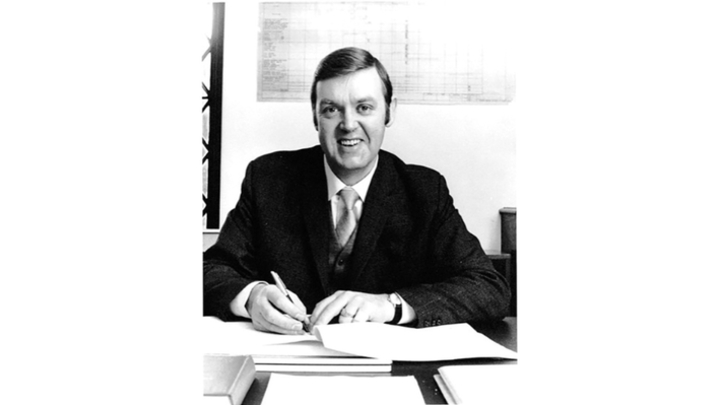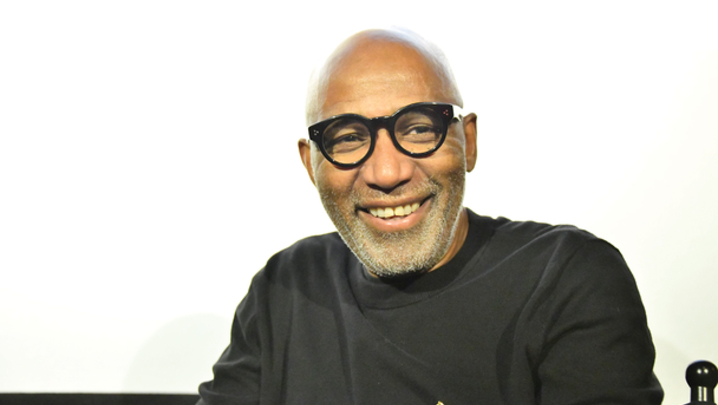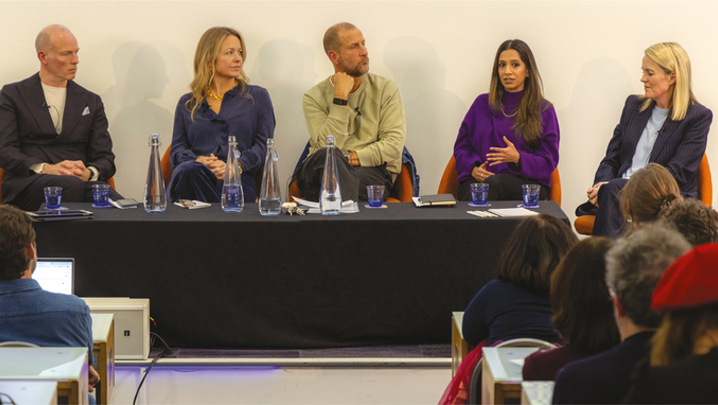In his first major appearance as Culture Secretary, Sajid Javid outlined the many areas where he believes regulation is in need of review
We're gathered here today to talk about "Power, Politics & The Media". And I have a very clear view of what power politicians should have over the media. As little as possible.
Politicians and government have no business controlling television. What we do have is a role to play in making the industry work for viewers.
That's why we're going to look at whether the time is right to remove Section 73 of the Copyright, Design and Patents Act, which could allow PSBs to invest more in high-quality content.
And that's why, in the coming weeks, I will be taking a long, hard look at the balance of payments [retransmission fees] between broadcasters and platforms. In our "Connectivity, Consumers & Content" strategy paper, we set out our ambition for "zero net fees", and a lot of progress has been made towards reaching that goal.
But I still want to know whether the amount of regulation around these transactions is really necessary.
And, of course, any changes here could have implications for other parts of the industry, such as EPG prominence. But, as you know, we're also going to be consulting on that issue shortly.
This is a complex area and it's a high-stakes game for everyone. But that's not going to stop me asking questions whenever I see a highly regulated market.
We need a regulatory system that can meet the demands of a world that has changed – and continues to change – in so many different ways. Just look at the way Britain consumes television in 2014.
Almost a quarter of us have watched a TV programme on our mobile phone. Twice as many have used an on-demand service in the past year.
Seventy per cent of young people watch television online, and half their media consumption is done on something other than a TV. Half a million households watch television through catch-up services alone. And, for many young people, traditional linear viewing is a thing of the past. So much so that, last month, "binge-watch" was added to the Oxford English Dictionary.
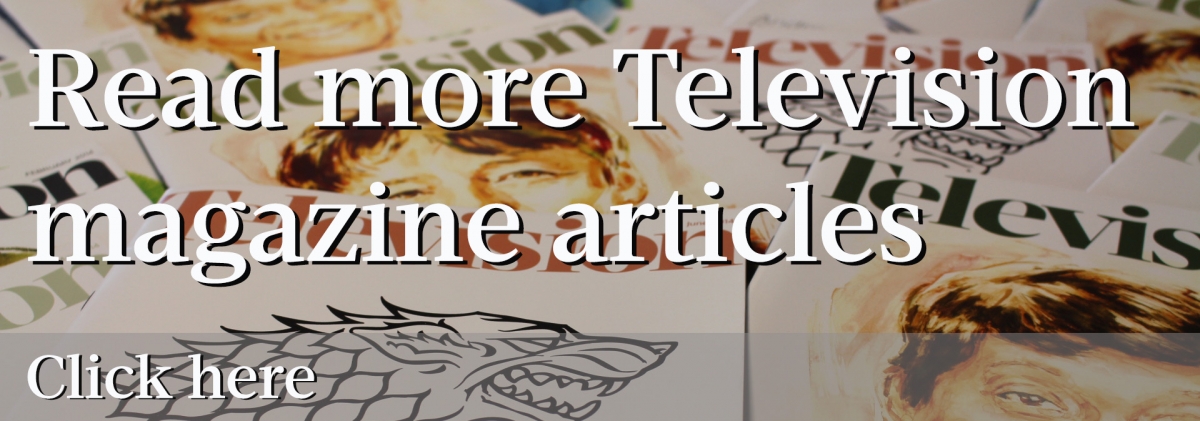 But all this change doesn't mean that television as we once knew it is dead. As John Plunkett and Mark Sweney have pointed out, while Kevin Spacey was using his MacTaggart Lecture to deliver an elegy for traditional TV, more than 12 million Britons were tuning in to broadcasts of Emmerdale and EastEnders.
But all this change doesn't mean that television as we once knew it is dead. As John Plunkett and Mark Sweney have pointed out, while Kevin Spacey was using his MacTaggart Lecture to deliver an elegy for traditional TV, more than 12 million Britons were tuning in to broadcasts of Emmerdale and EastEnders.
The vast majority of viewing is still linear, in the region of 90%. In fact, research published last year predicted that the convergence of technology might actually cause an increase in linear viewing.
Viewers still want to share stories and experiences, they just want those stories and experiences delivered in a way that suits their needs.
That means new platforms and new devices, something that presents new challenges in terms of spectrum. Almost a century ago, Lord Reith wrote of broadcasting that, "It does not matter how many thousands may be listening; there is always enough for others."
In 2014 that's not necessarily true. Spectrum is a finite resource. With more voices and more pictures and more data clamouring for space on our limited airwaves, we have to make decisions about how that space is used.
At the top of that list is the future use of the spectrum used by terrestrial TV; in particular, the frequencies below 700MHz. It's an issue the ITU's World Radiocommunication Conference will be looking at next year.
And I know many of you are worried about the prospect of co-primary allocation potentially putting our digital terrestrial network at risk.
There's still well over a year to go until the conference, so I can't say too much about the details of the position the UK government will take. However, I agree with the core findings of Pascal Lamy's recent report and I'm determined that we should not undermine our much-valued DTT network.
It's going to take a lot to convince me that there is a case for making the lower UHF bands co-primary.
The challenges we face aren't solely technological. The commercial landscape is shifting, too, particularly around the indies. The independent production sector has enjoyed explosive growth over the past decade, supported by government intervention on "qualifying indies" and the terms of trade.
But times are changing. High-profile buyouts have already led to the rise of the "super-indies". Foreign investment is pouring into the sector. And the changes to the BBC's production function proposed in Tony Hall's recent speech could also have a significant impact.
I want the success of the independent sector to continue. I want to see talented entrepreneurs setting up production businesses. And I want to see those businesses flourishing on the global stage.
To ensure that happens in a changing world, we may have to review the terms of trade and the related legislation on qualifying indies.
That's something we'll be looking at once Ofcom has published its PSB review next summer.
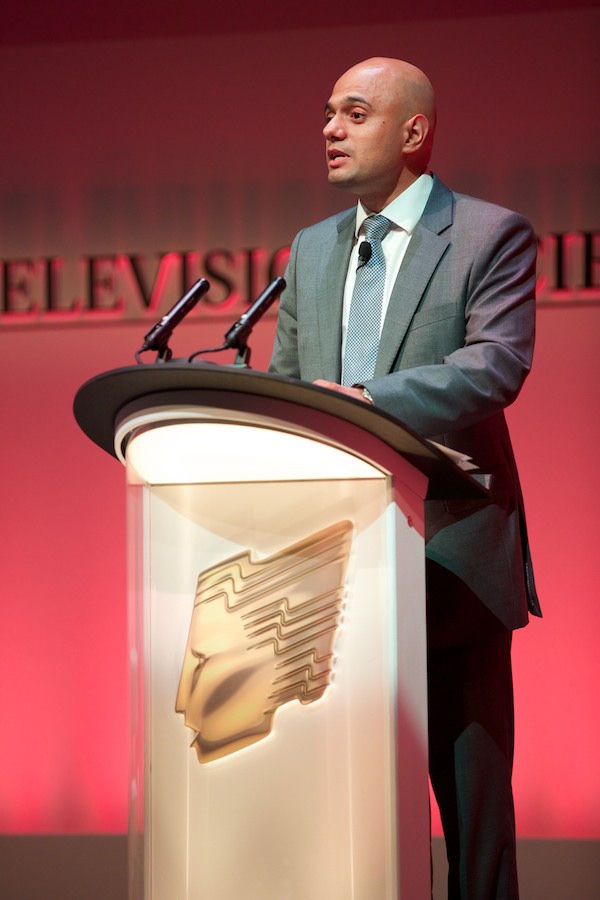 The Rt Hon Sajid Javid MP speaking at the London Conference (Credit: Paul Hampartsoumian)
The Rt Hon Sajid Javid MP speaking at the London Conference (Credit: Paul Hampartsoumian)
Alongside changes in technology and business, there's also the issue of training – of equipping talented people with the skills they need to compete in the 21st century.
I know that's the subject of the next discussion, so let me take this opportunity to highlight the Sky Academy and 4Talent programmes run by Sky and Channel 4, respectively. Both aim to create new opportunities for young people, and both should be applauded for their efforts.
We've also just seen a major change at the BBC Trust. The past few years have been tough for the BBC. Too often, the corporation has been making the headlines instead of just reporting on them.
But let's not lose sight of how successful it can be. Both on-air and behind the scenes, the BBC is home to some of broadcasting's most talented, hardest-working individuals.
Together, they create exceptional content that is enjoyed across Britain and around the world. Every week the average Briton spends 18.5 hours in the company of Auntie.
The number of TV channels has exploded in the past decade, but the corporation's audience share has only fallen by a few percentage points.
Through television, radio and online, the BBC regularly reaches 96% of people in the UK and a quarter of a billion more in 200 countries worldwide.
It's a massive institution, it's a vital institution, and it deserves the very best leadership. That's why I was absolutely delighted to recommend Rona Fairhead as our preferred candidate to be the new Chair of the BBC Trust.
Rona's arrival provides the opportunity for fresh thinking at the top of the BBC Trust, a new set of eyes and a new head full of ideas.
It was absolutely right that this Government took the bold step of freezing the licence fee in 2010. It provided the BBC with a stable funding profile for seven years and gave fee-payers some much-needed certainty; £145.50 is a lot of money for most people to find each year.
Thanks to our long-term economic plan, the British economy is growing again after the deepest recession in almost 100 years. But the hard-working families who fund the BBC are still finding savings wherever they can.
While I support the work Tony Hall is doing to find savings across the corporation, I believe more can and must be done to make the BBC more efficient.
For example, not long after I became Secretary of State I travelled to Jersey to meet the Commonwealth Games baton. What I found odd was the number of people representing one broadcaster. The BBC had 10 staff in attendance, three of them reporters. Is that really justifiable?
Of course, it's difficult to talk about the licence fee without asking questions about the enforcement regime behind it.
In 2012/13, almost 200,000 people ended up in court accused of not buying a TV licence. More than 50 were sent to prison.
When over 10% of Magistrates' Court cases concern this one offence, you have to ask whether the current system is really working.
The Government is committed to launching a review of decriminalisation once the Deregulation Bill receives royal assent. But we can't afford to wait that long. This needs to begin now.
"We are living in a golden age for British television... the quality of programming is reaching new heights"
Very shortly, I will be publishing the terms of reference for a review of TV licence enforcement. I expect it to begin taking evidence in the autumn, and to conclude early in the next parliament.
I don't want to pre-empt the Charter review. I want to ensure that, when it begins, it has a solid evidence base on which to draw.
Whether at the BBC or in the commercial world, television is an industry in which the balance of power is constantly shifting – where the number of players in the hunt for quality content has never been greater and where competition at all levels has never been fiercer.
But one thing is not in any doubt. We are living in a golden age for British television. It is a time in which the quality of programming is reaching new heights and innovative platforms are reaching new audiences.
And whether in terms of economic impact or overseas ratings, all the facts show that the people in this room today are among the world's best and most successful.
I want that success to continue, but I know it's not going to be easy. After all, technology is changing. Audiences are changing. The television industry is changing.
And, if we want to best support you in the years ahead, the way government works with the media has to change, too.
Some of you will welcome that, others will be worried about what it may mean for you and your organisations. So let me reassure you. This Government is listening to you, working with you, and delivering for you.
The business of broadcasting may be in flux, but our determination to support our world-beating television industry is not going to change.
This is an edited version of the speech made by the Secretary of State for Culture, Media and Sport, the Rt Hon Sajid Javid MP, to the RTS London Conference. He was interviewed by Rob Woodward, CEO of STV Group. The session was produced by Sue Robertson. You can watch the speech in full at rts.org.uk.
Question & answer
Q Rob Woodward: Do you think the BBC Trust is the optimum regulator for the BBC?
A Sajid Javid MP: It's a big issue and, rightly, it needs to be looked at through the Charter review process.
It's fair to say that the BBC Trust has had a number of issues these last few years. No one can put their head up and say it's worked perfectly. We need to look at it and see if there is a better way... Looking at governance will be part of the Charter review process, which will begin after the election.
Q Rob Woodward: In your speech you refer to Section 73 of the Copyright, Designs and Patents Act – that's retransmission fees. The ITV-sponsored report published earlier this week sets out a very strong case for retransmission fees.
Earlier today here, Jim Ryan expressed a different view. BSkyB is on record as saying that, if retransmission fees are adopted, you're effectively asking consumers to pay twice. What is your position?
A Sajid Javid MP: In my speech I talked about the relationship between PSBs and pay channels. The rules that are in place at the moment... were set in a different age and had a purpose at that time...They were introduced in the 1980s, when we wanted to help the cable industry grow. They were given this exception that they could retransmit without paying any fees.
At that time it made a lot of sense... Now that we have a much bigger, more mature industry, the question is, "Is it still required?"...
It's also linked in with other rules... The PSBs do get things in return [for making their channels available free on cable and satellite platforms] such as EPG prominence... The two things go together. If you're going to look at them, you have to look at them together.
Q Rob Woodward: What do you watch on TV?
A Sajid Javid MP: The last BBC programme I watched was Doctor Who on Saturday. I love Game of Thrones. It's great that it is made in Britain. I like The X Factor. Being a politician, I watch all of the PSBs' news programmes and Sky News.
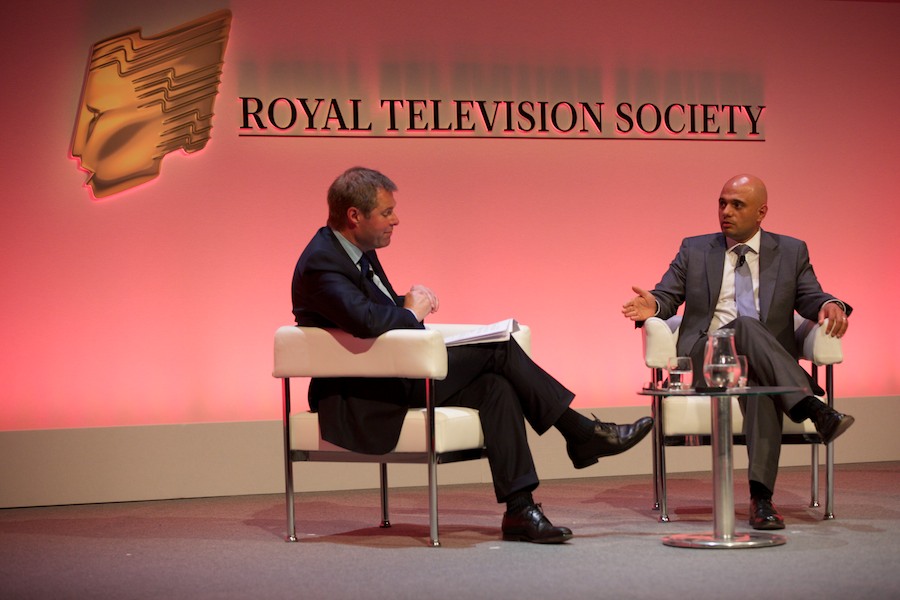 Conference chair Rob Woodward teases out Sajid Javid MP's views on the BBC (Credit: Paul Hampartsoumian)
Conference chair Rob Woodward teases out Sajid Javid MP's views on the BBC (Credit: Paul Hampartsoumian)
Q Jane Martinson, Head of Media, The Guardian: Rona Fairhead was asked this morning if she was the preferred candidate because she was a woman. She was also asked whether she thought the BBC was diverse enough. What is your response to those two questions?
A Sajid Javid MP: Unfortunately, I am not surprised that someone asked her if she is the preferred candidate because she is a woman.
If it was me, I'd find that question quite offensive. Her CV speaks for itself... The quality of her achievements is quite incredible. It reminds me of when I first became a minister, people asked me if I was made a minister because I am brown. I found that offensive...
In terms of diversity at the BBC, there could be more... The BBC recognises that more can be done. Tony Hall has made a big issue of this, and rightly so... It is something we closely monitor.
In my speech I mentioned Sky and Channel 4 as two other organisations that take this very seriously. Many others do, but this is an important space in the media industry and I am glad so many are taking it seriously.
Q Ade Rawcliffe, Diversity and Talent Manager, Channel 4: Lenny Henry is calling for ring-fenced funding for ethnic-minority topics and companies. What is your view?
A Sajid Javid MP: I've met Lenny Henry and discussed this and other ideas. Ed Vaizey has met him and others to discuss this and other issues...
I am pleased that ideas are being suggested. It's a new way of thinking, but to pursue that you have to look at the evidence carefully and at whatever the potential cultural impact could be. It's not something this Government is pursuing. But we are working on other initiatives with the industry... We will keep this area under review and see what can be done in the future, if required.
Q John Plunkett, The Guardian: You said the BBC can and must make more efficiency savings, but the BBC has said it has come to the end of the road in terms of the efficiencies it can make and not affect existing services.
Can you give examples of where savings can be made and are you prepared to see the loss of services?
A Sajid Javid MP: The size of the organisation and the number of areas it is involved in suggest there are more areas where savings can be made. It is not for me to decide where those savings must come from. That is up to everyone involved in running the organisation.
As someone who thinks hard about the burdens families face when they have to pay their licence fee, it is right that we ask these kinds of challenging questions.

